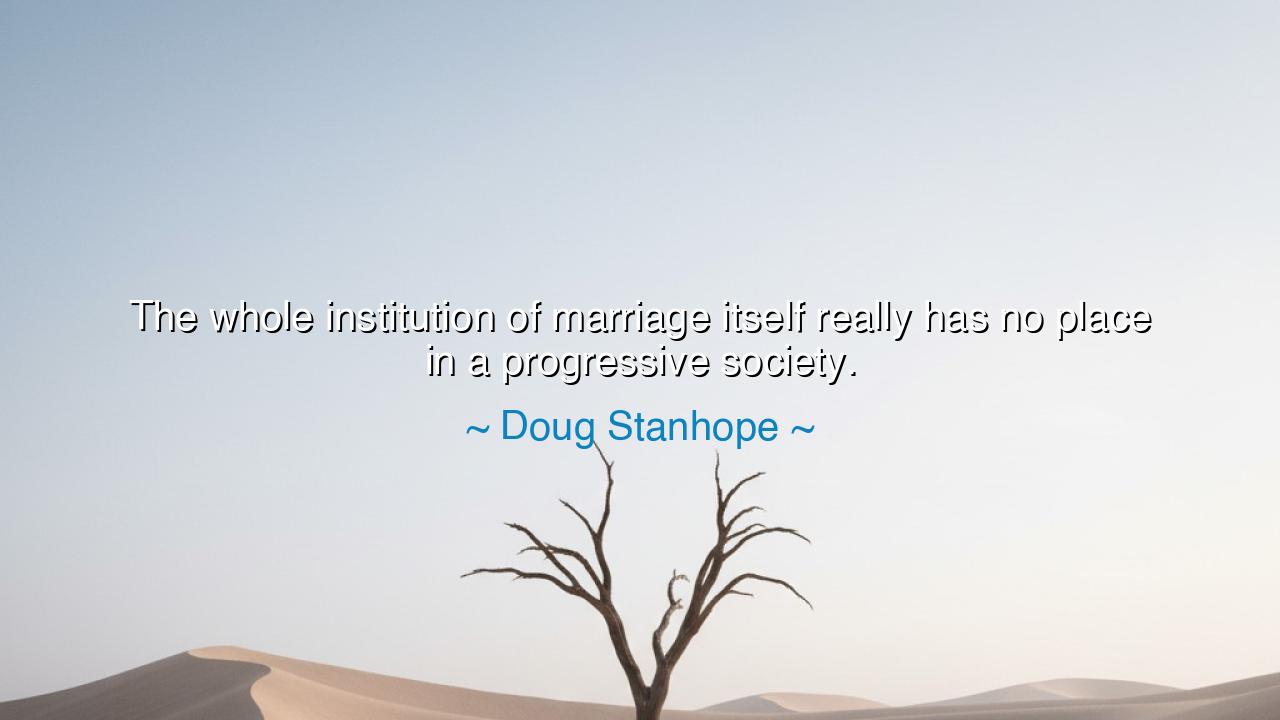
The whole institution of marriage itself really has no place in a






The words of Doug Stanhope — “The whole institution of marriage itself really has no place in a progressive society.” — strike like a hammer upon the walls of tradition. They are not the idle musings of rebellion, but the voice of one who gazes upon human customs and dares to ask: Have we outgrown the cages we once called sacred? In these words lies a question that echoes across ages — whether the structures we inherited from the past continue to serve our evolving hearts, or whether they bind us to old forms when the spirit yearns for freedom.
Doug Stanhope, a comedian by trade but a philosopher by spirit, speaks not against love, but against confinement. His challenge to the institution of marriage is a challenge to the idea that love requires ownership, legality, or the sanction of the state. To him, marriage, though once noble, has become a symbol of conformity — a relic from an age when partnership was bound not by affection, but by duty, property, and fear. His words burn with the fire of the progressive soul, which seeks truth even when that truth unsettles comfort. For progress, as the ancients knew, is not born from obedience but from questioning.
In ancient times, marriage was not a union of equals, but a transaction of power. Among the Greeks, women were given in marriage as alliances between families; among the Romans, wives were bound to their husbands by law and expectation. Love, that wild and divine force, was often a stranger to the marital bed. It was not until the later ages that love dared to mingle with matrimony — yet even then, the chains of ownership and obligation remained. When Stanhope declares that marriage “has no place in a progressive society,” he speaks to this very evolution: the idea that love should no longer wear the armor of possession, that freedom itself is the truer bond between souls.
Consider the life of Simone de Beauvoir and Jean-Paul Sartre, two spirits who defied the conventions of their time. They shared a lifelong partnership of intellect and affection, yet they refused to bind themselves in legal marriage. To them, love was a living thing — not to be enclosed by vows or ruled by law. They believed that commitment must be chosen each day, not enforced by contract. Their love, though unconventional, endured longer than many sanctioned unions. In their example, we see the meaning of Stanhope’s words made manifest: that true connection may flourish more freely outside the rigid walls of social tradition.
Yet let us not mistake his words for contempt. The ancient mind understands that destruction is not the opposite of creation, but its prelude. When one says that an old institution “has no place,” it is not always to scorn it, but to release it — to allow new forms to grow from the soil it once nourished. Stanhope’s provocation is thus a call to reimagine love, to separate the eternal truth of devotion from the temporal customs that have contained it. Marriage, in his view, is not evil — it is simply outdated in a world where individuals seek equality, authenticity, and personal freedom as the highest virtues.
Still, his words also test our humility. For many, marriage remains a vessel of meaning — a promise, a faith, a home. The wise do not reject these hearts, but ask instead: what is it that we truly seek when we marry? If it is recognition, love needs no witness. If it is permanence, no law can guarantee it. If it is partnership, it may flourish with or without ceremony. Thus, the question Stanhope poses is not whether one should marry, but whether one should do so mindfully — by choice, not tradition; by conviction, not conformity.
The lesson, then, is not to scorn marriage, but to see through it — to ask what part of it serves the heart, and what part serves the illusion of security. The progressive soul, like the seeker of truth, must be brave enough to discard what no longer fits and compassionate enough to honor what still holds meaning for others. Love, after all, is not weakened by freedom; it is sanctified by it.
So remember, my child: whether you bind yourself by vow or walk the path of freedom, let it be done from conscious choice, not from fear of solitude or the weight of custom. For the truest union is not that which law declares, but that which two souls continually renew in mutual respect and understanding. As Doug Stanhope reminds us, the forms of love may change with time, but its essence — the yearning to connect, to grow, to be seen — remains eternal. A progressive society does not discard love; it simply learns to love more honestly, without the chains of yesterday’s forms.






AAdministratorAdministrator
Welcome, honored guests. Please leave a comment, we will respond soon